| Ligne 109 : | Ligne 109 : | ||
This is once again the basis of the approach, to create links, to meet people who are active in this field, and to have a good time with nice people! | This is once again the basis of the approach, to create links, to meet people who are active in this field, and to have a good time with nice people! | ||
| − | + | There are already [https://lowtechlab.org/fr/le-low-tech-lab/les-actions/programme-communaute existing communities], get in contact with one of them, find out if you can meet them, allow them to share their experience with you! | |
| − | |||
| − | |||
Then when your structure is setup, other people will be happy to benefit from your own feedback. | Then when your structure is setup, other people will be happy to benefit from your own feedback. | ||
Version du 5 avril 2022 à 15:34
Description
A methodological step by step tutorial guide to show local communities how to spread the philosophy and the know-hows of low-tech in your region
Sommaire
Sommaire
- 1 Description
- 2 Sommaire
- 3 Étape 1 - Role world-wide
- 4 Étape 2 - What to expect from a local community?
- 5 Étape 3 - Discover more about low-techs
- 6 Étape 4 - Explore your surroundings
- 7 Étape 5 - Make yourself known!
- 8 Étape 6 - Reach out to existing communities
- 9 Étape 7 - Organise your first meeting
- 10 Étape 8 - Your first workshop
- 11 Étape 9 - What kind of structure?
- 12 Étape 10 - The Low-tech Lab charter
- 13 Étape 11 - What's next?
- 14 Étape 12 - Joining the global community
- 15 Étape 13 - Stay patient
- 16 Notes et références
- 17 Commentaires
Étape 1 - Role world-wide
"The islands of a growing archipelago"
Establishing a link between territories, as close as possible to needs is the be-all and end-all of the low-tech approach.
Digital distribution channels help to raise awareness and to get to to know this approach, however then you have the people who put it into practice.
Local communities made up of beginners, experienced and/or expert citizens play this leading role in local dissemination, collaborating with the actors in their territory.
They are equally interlinked with each-other in orde to share and exchange resources, ideas, discoveries and sound practices.
"Map from this post- available in HD"
https://lowtechlab.org/fr/actualites-blog/l-archipel-low-tech-en-france-illustre
Étape 2 - What to expect from a local community?
"From doing, in a dense and resilient local network"
Workshops to experiment with low-tech on oneself, to help citizens become more self-sufficient and to bring out their DIY side!
A detailed knowledge of the players in its territory, the sources of reuse resources, the craft skills of its region, etc.
Strong links with public, academic and entrepreneurial structures in order to spread the low-tech approach to various levels and to help transform these players.
If you are motivated, love to communicate, meet people, and talk about low-tech, then this is a very good start!
"Photo: Low-tech Tour of Grenoble 2019- Sunflower Farm"
Étape 3 - Discover more about low-techs
"The basics of an evolving concept"
If you are here, then you probably already have a decent amount of information on the topic.
When setting up a local community, you will be lead to answer many questions on your project and low-techs. It is always a good idea to get information beforehand in order to fully understand the issues at stake and to put your vision and ideas on paper in order to share them more easily.
If you haven't done it yet, we invite you to consult our website to discover projects driven by the Low-tech lab, other existing structures, additional references if you wish to go further as well as definitions other than ours!
- Note de la Fabrique écologique, 2019
Étape 4 - Explore your surroundings
"Hello, is there anyone here?"
Some convinced people may have already started to work together to spread the low-tech approach in your region. How can you find them?
Our directory can help you search for what is existing near you.
If not, there may be a Facebook group like "Low-tech Gironde" or even "Low-tech Lab Grenoble" with the name of your locality. If it doesn't exist, don't hesitate to create it!
- Directory of low-tech Actors
- Low-tech Lab France Facebook Group
Beyond social networks, talk about it to your friends, colleagues and other associations, the grain of low-tech may already be present in other people.
Étape 5 - Make yourself known!
Hey I'm here!
We are currently working with the platform Discord to host local communities and the network of shared common grounds!
Come take a look, introduce yourself, and tell us that you are setting up a project!
- Access link for French-speaking Discord
There you will find an FAQ and specific channels to ask for help for technical or administrative questions for example.
Étape 6 - Reach out to existing communities
The humans behind the screens
This is once again the basis of the approach, to create links, to meet people who are active in this field, and to have a good time with nice people!
There are already existing communities, get in contact with one of them, find out if you can meet them, allow them to share their experience with you!
Then when your structure is setup, other people will be happy to benefit from your own feedback.
Photo : Low-tech Tour Grenoble Takeoff -
Étape 7 - Organise your first meeting
"Champagne time ! "
Once you have gathered a team using whatever platform (Facebook group, Whatsapp, Framateam, Discord, local newspaper adverts...), it's time to meet! Over a beer in a bar, in a park, a meeting room, at your local association's house, any place will work. And don't forget to celebrate this first meeting, it is the beginning of a great adventure.
Throughout this event and the following ones (meetings, workshops, stands...), don't hesitate to take pictures! This can always be come in handy when promoting projects and communicating on your activities. Be careful, however, make sure to gain permission and rights in order to use images with identifiable people present.
Photo : The Inauguration of the local Low-tech Lab of Grenoble, 2020"
Étape 8 - Your first workshop
"Heads up!"
Many people are joining the low-tech movement to make use of their hands (maybe this is your case!). Many workshops can be easily carried out with only a few materials, tools, and quick results!
These few guides can help you to organise one, but if you have other ideas, don't hesitate to share them!
For all your workshops open to the public, we advise you to add them to the agenda.
You will find under the tutorials section this list "exhibition sheets" in the "File" tab next to the "Tools and Materials" paragraph.
Photo : Stoves workshop / rocket stove, Low-tech Lab Grenoble
Étape 9 - What kind of structure?
It's not about the name
If you are starting from scratch, we obviously encourage you to build an association with your collective, this is the easiest way for the basic formalities: looking for a space, collecting memberships, buying material/tools...
We provide a graphic charter to build the Low-tech Lab Local identity that correlates with your region, as well as support for administrative issues.
If you already have an association/identity/name or you want to create one using another name, and you also have the objectives of promoting and spreading the word about low-tech, no problem! There are already a couple that are part of our network.
- Charte Graphique of communities
- Discord Channel #help_admin
Étape 10 - The Low-tech Lab charter
"'Bringing together energies
We suggest that new and existing communities wishing to join the network download and send back signed to us (at community@lowtechlab.org) the Low-tech Lab Charter, which highlights our values, and our principles of behaviour.
It can be found in the "Files" tab at the top of the tutorial.
Étape 11 - What's next?
More champagne...?
We're sure that you'll soon be flooded with ideas from your members in your community and with requests from people who will hear all about you!
Many different actions are relevant , from raising awareness through stands at events, conferences, workshops, setting up projects with local partners, creating informative lessons to tutorials in order to feed the platform starting from low-tech tested at home or discovered in your region...
In any case, don't forget to continue to enjoy yourself and organise meetings and festive events with your community, this is what builds the strongest teams and the most beautiful friendships!
Photo : Stoves workshop / rocket stove, Low-tech Lab Grenoble"
Étape 12 - Joining the global community
The more the merrier...
If you haven't already done so, it's time to come and talk to others about your community, to share your successes, your failures, your technical, administrative and economic questions... Others have perhaps already experienced or are experiencing the same thing, and would be delighted to work with you through these issues!
=> Register your structure and the one that you discover in your region at l’annuaire.
=> Register your events at l’agenda.
=> Participate in monthly calls (follow the announcements on a Discord channel linked)
Photo : Weekend Communities Low-tech Lab 2019 - Grenoble
Étape 13 - Stay patient
Like a good wine'
Building a community isn't just a weekend activity. But it is well worth the effort, gain personal experiences, make new friends, step by step, ask for help, and celebrate your successes!
These documents show the erection and evolution of several structures over the years. They are examples among many others, but can give you an idea of how just long the different important milestones in the lifetime of these associations have taken!
#MakingOf_Low-tech_Lab (under construction)
#MakingOf_Low-tech_Lab_Grenoble
#MakingOf_Low-tech_Lab_BBGP (under construction)
Notes et références
Version 2.0 august 2021
Published
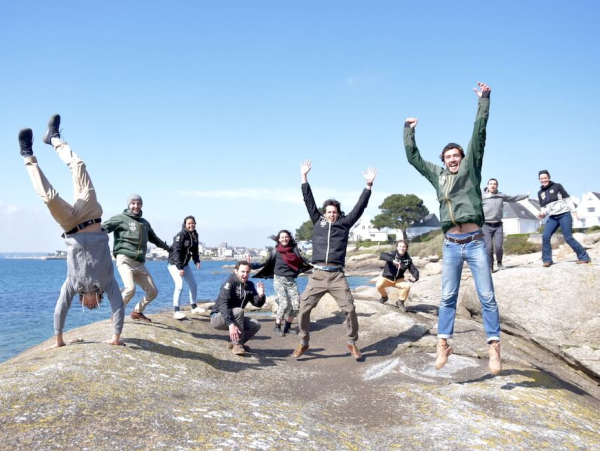
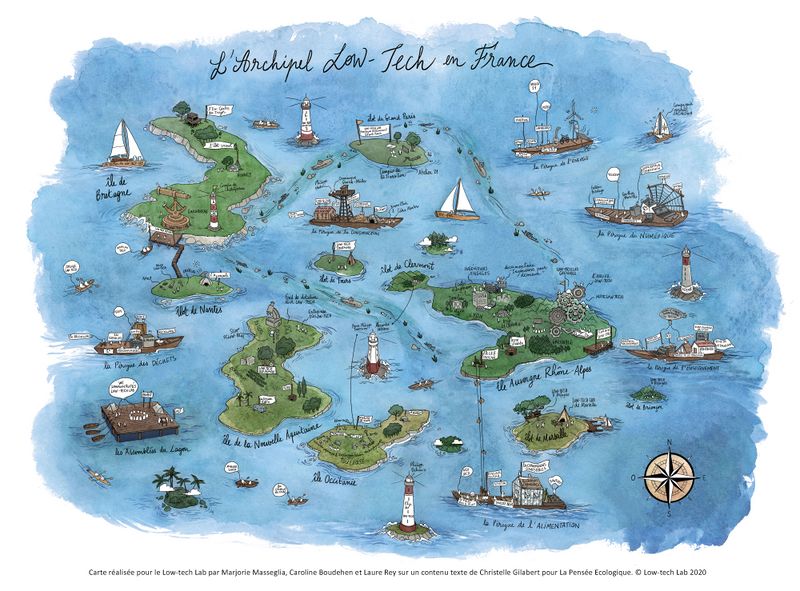
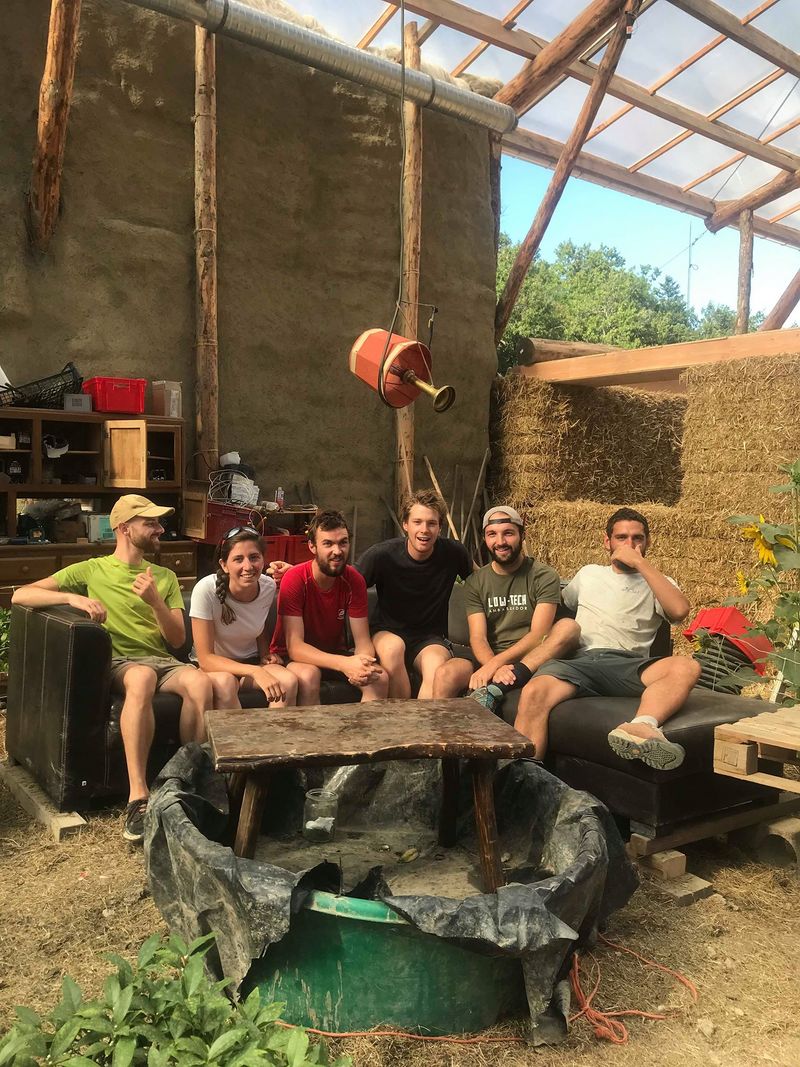

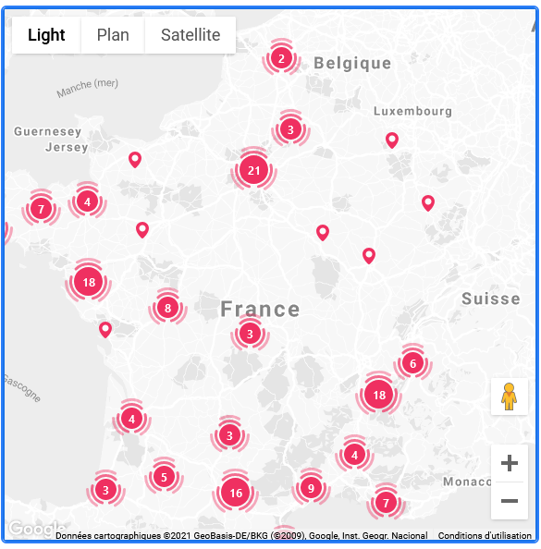
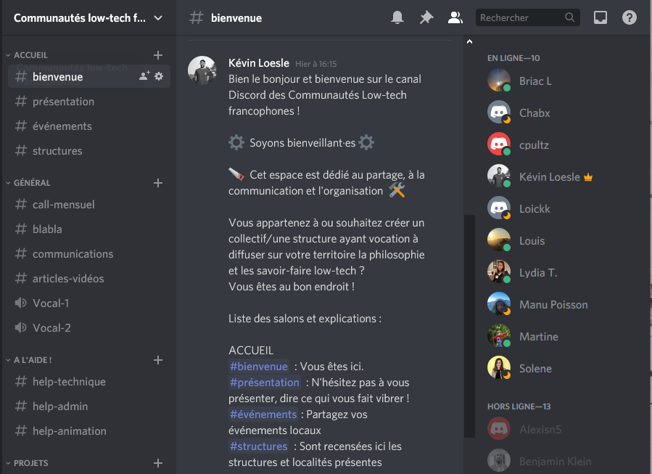
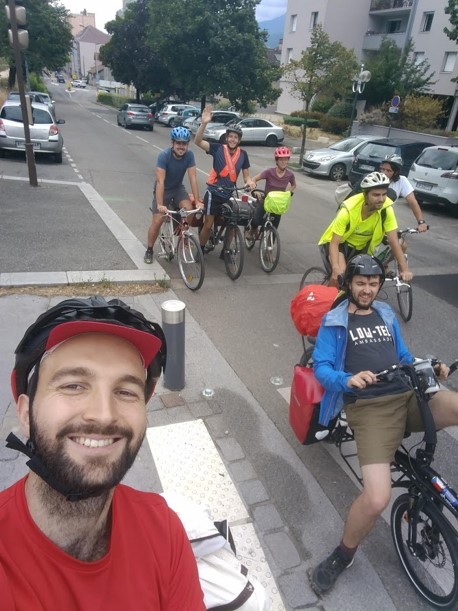
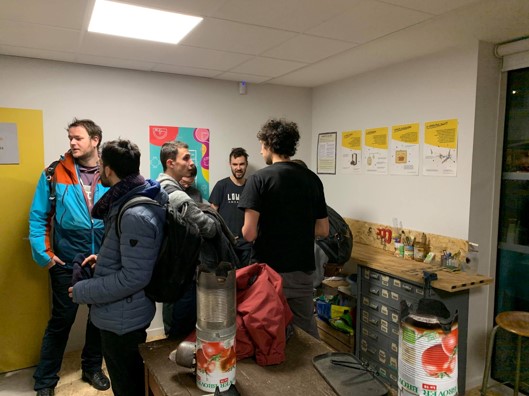
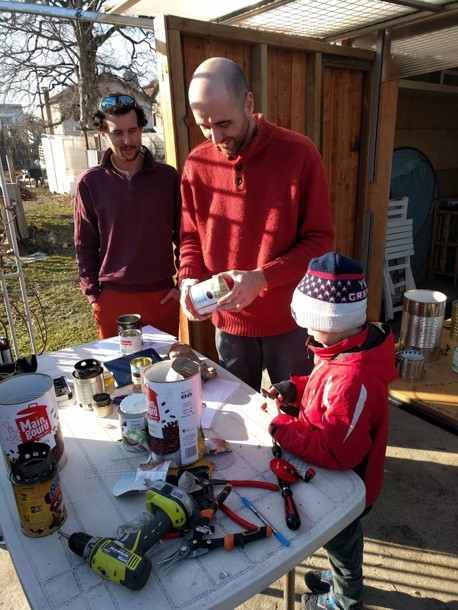

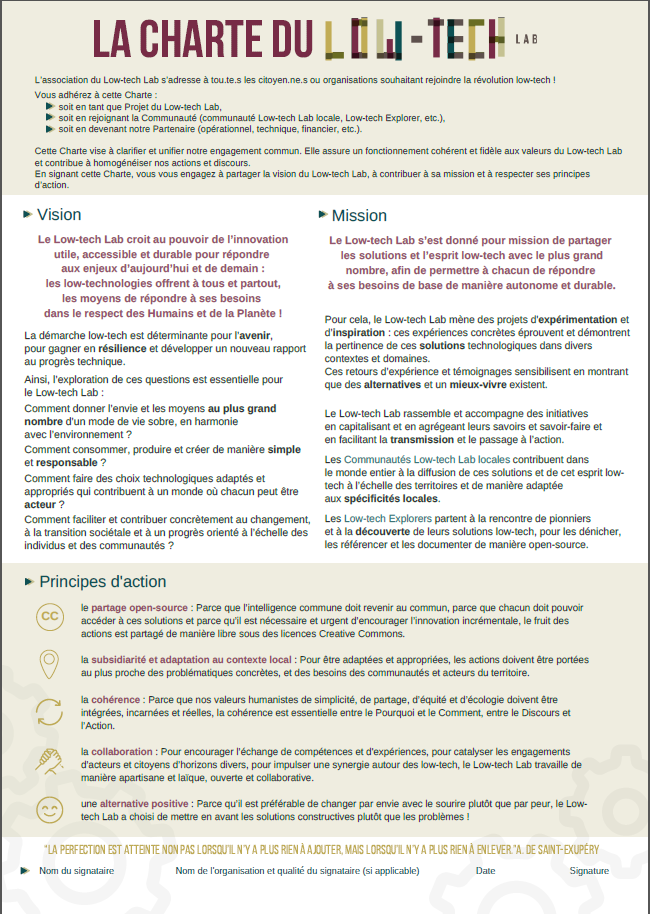
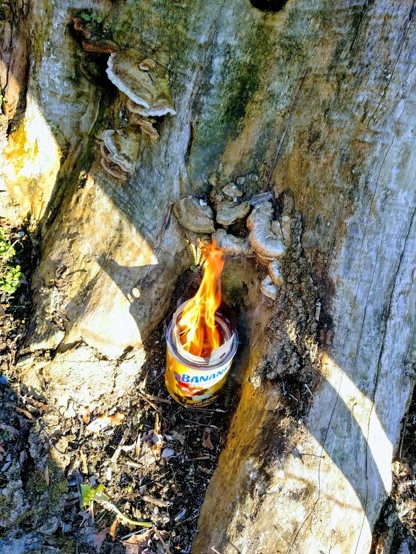
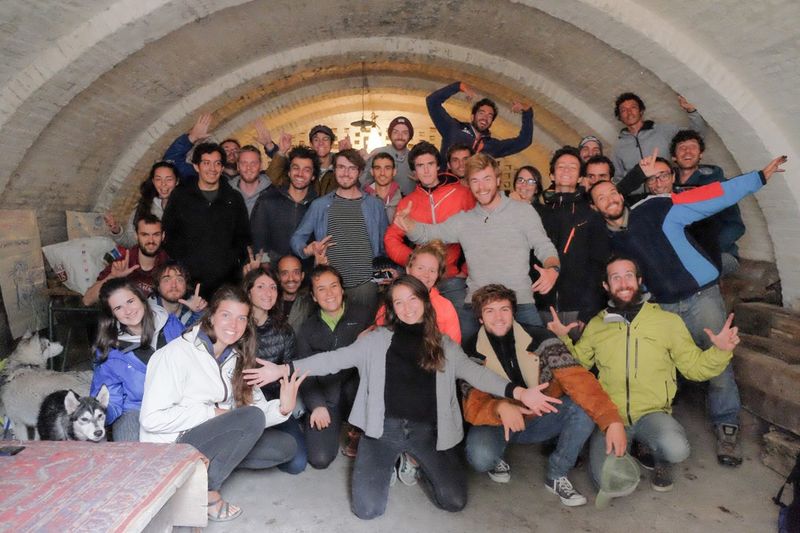
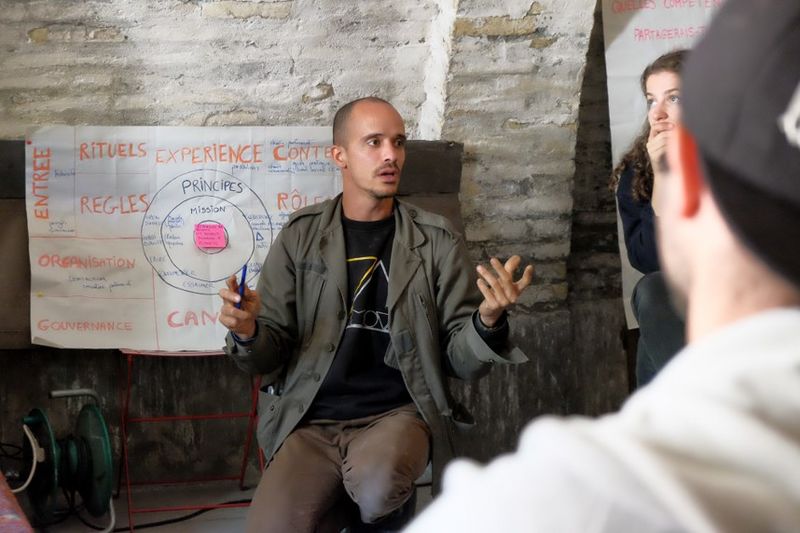
 Français
Français English
English Deutsch
Deutsch Español
Español Italiano
Italiano Português
Português